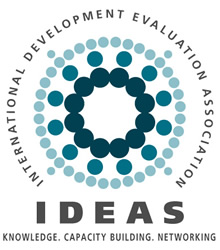Who We Are
The International Development Evaluation Association (IDEAS) was inaugurated in September 2002 to meet the need for a global professional association for internationally active development evaluators. Over the years, much has changed in the global evaluation community. Many new national and regional associations and networks have been created and play a progressively stronger role. Global partnerships and communities of practice have been formed, allowing joint efforts between both evaluation professional associations and organisations. The changing agenda from the Millennium Development Goals to Sustainable Development Goals, the Paris Agreement on Climate Change, the Coronavirus pandemic and the rapidly changing landscape of financing for development pose major challenges.
Within this renovated context, IDEAS positions itself as the only global professional evaluation association which focuses on international sustainable development. Over the years it remains the only home for evaluators working globally and on global issues, with a global perspective. It is deeply involved in strengthening and promoting the profession, fostering capacity development, and improving and advancing evaluation theories and practice, methods and use of evidence.
Our Mission
IDEAS’ mission is to improve and extend the practice of development evaluation by refining knowledge, strengthening capacity, and expanding networks for development evaluation, particularly in developing and transition countries.
Values
The mission of IDEAS is rooted in its core values and principles, meant to guide the behaviour of its members. IDEAS expects its members, in any role in which they are engaged in a development evaluation process, to display integrity, honesty and respect. Members are guided by a Code of Ethics detailing:
- Ethical Principles – organized based on the IDEAS mission and values expressed and translated in broad behaviour orientations;
- Code of Conduct – containing specific rules of conduct for evaluators concerning (1) colleagues and the Association;(2) the public and stakeholders, including the client;(3) the profession of monitoring and evaluation in the development context, and the development field itself, comprehensively understood as the sustainable development of societies;
- Application – Ways to use the Code of Ethics to preserve the high spirit of the Association so it can accomplish its objectives and mission.
Strategic Objectives
- To contribute to professional knowledge, ethics, conceptual thinking and standards in international development evaluation;
- To enhance the capacity of its members and international development evaluators in general;
- To provide a platform for the exchange of experiences and knowledge amongst its members and in general for the profession;
- To promote governance, learning from evidence and accountability for development;
- To foster partnerships for the evaluation of sustainable development;
- To strengthen IDEAS global nature through partnerships and close collaboration with regional and national associations.
These strategic objectives are developed in our work and policies. Members are invited to get involved in IDEAS Thematic Interest Groups, Projects, Programmes and other initiatives, while they benefit from being engaged in an Association that works for the recognition and strengthening of the Evaluation profession.
IDEAS LEGAL STATUS AND GOVERNANCE
IDEAS is registered with the Charity Commission of England and Wales, holding the Company number 04655266 and the Charity number 1098370. It reports annually to Charities Commission following the Companies Act 2006, Charities Act 2011 and the United Kingdom Financial Reporting Standards, having its Board members as trustees.
IDEAS is a voluntary democratic organisation governed by an elected 10-member Board, consisting of an Executive Committee, with President, Vice-President, Secretary-General and Treasurer, and 6 representatives from the regions of the world. Its foundational documents include a Constitution, Election By-Laws and the Code of Ethics, which are approved by members and implemented by the governing Board. Documents as Policies discipline and organize other activities of the Association.
Membership fees and grants from donors support all activities of the Association, including administrative support and facilities, publications, and conferences.


